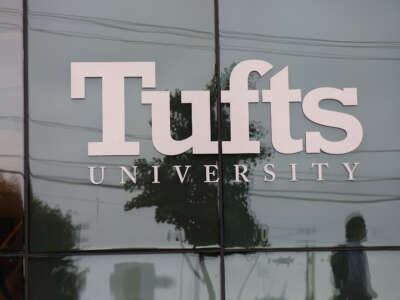Florida Atlantic University’s police department has a pending agreement with the federal government that would allow campus officers to question and detain people they suspect are in the country without authorization.
The public university in Boca Raton could be the first to enter such an agreement with U.S. Immigration and Customs Enforcement, which lists the campus police department as one of 75 entities that have submitted paperwork for consideration.
FAU’s trustees in February picked a new president: Adam Hasner, a former GOP state lawmaker and executive of a for-profit prison group that manages 16 ICE detention centers across the country.
Hasner served in the Florida House of Representatives from 2002 to 2010, taking the role of House majority leader during his last three years in the chamber. Between 2016 and his appointment at FAU, he was executive vice president for public policy at the GEO Group, where he oversaw 60 consultants representing the company’s interests in D.C., according to his resume.
The $4 billion company’s stock value doubled after Election Day, according to ProPublica.
Following a two-year-long presidential search, FAU’s trustees picked and the state university system’s Board of Governors confirmed Hasner as the new president, with a base salary of $875,000 and a potential performance bonus of $150,000, according to his contract.
“When I step onto this campus, if I were to be the eighth president of this university, my commitment to you, sir, and my commitment to this board and my commitment to this entire university community is that I am not involved in partisan politics,” Hasner told trustees during the Feb. 10 meeting when they picked him. “I do not believe that it is politically red or politically blue to be a university president.”
“Incredibly Concerning” and “Unbelieveable”
The university of more than 31,000 students describes itself as a Hispanic-serving institution and the number-one Florida public university in terms of campus ethnic diversity.
Details of the paperwork FAU submitted to ICE, such as the number of officers it intends to deputize, have not been published.
Paula Muñoz, executive director of Florida Student Power Network, said that, considering Hasner’s background with GEO Group, she wasn’t surprised FAPD could be the first campus department to deputize its officers to act as immigration enforcement agents, which requires them to undergo a 40-hour online training.
“It’s incredibly concerning. It’s something that should not be a part of the education or institutions,” Muñoz said in a phone interview with Florida Phoenix. “They should be worried about how to make sure that students are feeling safe on campus.”
The pending agreement raised concerns for FAU junior Nicholas Ostheimer in light of the detention of nearly a dozen students and faculty across the country. He led the student protests against Hasner’s selection as president.
“It’s unbelievable and it’s an insult to our community and an attack on our freedoms,” Ostheimer told the Phoenix.
Push for as Many ICE Agreements as Possible
Meanwhile, the DeSantis administration is pushing for cities and counties to enter into the agreements that the governor has characterized as the maximum level of collaboration and has said will lead to street-level enforcement. So far, Florida cities, counties, and state agencies have entered into 194 agreements with ICE, although some of the agreements are aimed at apprehending people without legal status already in jails and prisons.
In early March, the chief of Pinellas County Schools Police signed and submitted paperwork to enter into the task force model agreement with ICE without the knowledge or authorization of the school board and superintendent, which he later told the board he had done because he thought he had to comply.
The school district didn’t know about the agreement until the Phoenix contacted a spokesperson for comment.
FAU and ICE didn’t respond to the Phoenix’s request for comment.
We’re not backing down in the face of Trump’s threats.
As Donald Trump is inaugurated a second time, independent media organizations are faced with urgent mandates: Tell the truth more loudly than ever before. Do that work even as our standard modes of distribution (such as social media platforms) are being manipulated and curtailed by forces of fascist repression and ruthless capitalism. Do that work even as journalism and journalists face targeted attacks, including from the government itself. And do that work in community, never forgetting that we’re not shouting into a faceless void – we’re reaching out to real people amid a life-threatening political climate.
Our task is formidable, and it requires us to ground ourselves in our principles, remind ourselves of our utility, dig in and commit.
As a dizzying number of corporate news organizations – either through need or greed – rush to implement new ways to further monetize their content, and others acquiesce to Trump’s wishes, now is a time for movement media-makers to double down on community-first models.
At Truthout, we are reaffirming our commitments on this front: We won’t run ads or have a paywall because we believe that everyone should have access to information, and that access should exist without barriers and free of distractions from craven corporate interests. We recognize the implications for democracy when information-seekers click a link only to find the article trapped behind a paywall or buried on a page with dozens of invasive ads. The laws of capitalism dictate an unending increase in monetization, and much of the media simply follows those laws. Truthout and many of our peers are dedicating ourselves to following other paths – a commitment which feels vital in a moment when corporations are evermore overtly embedded in government.
Over 80 percent of Truthout‘s funding comes from small individual donations from our community of readers, and the remaining 20 percent comes from a handful of social justice-oriented foundations. Over a third of our total budget is supported by recurring monthly donors, many of whom give because they want to help us keep Truthout barrier-free for everyone.
You can help by giving today. Whether you can make a small monthly donation or a larger gift, Truthout only works with your support.
Read full article at source
Stay informed about this story by subscribing to our regular Newsletter

